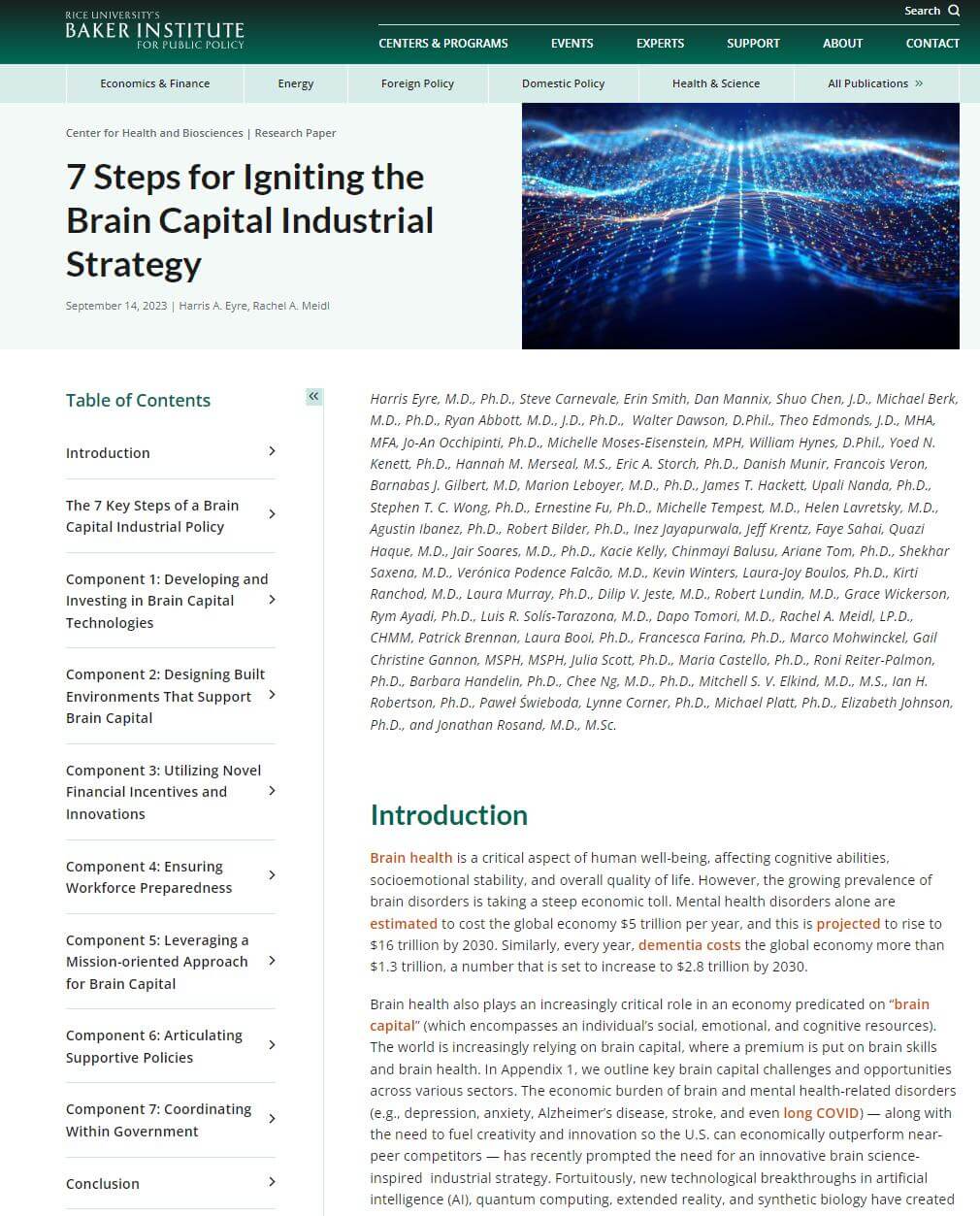Brain health is a critical aspect of human well-being, affecting cognitive abilities, socioemotional stability, and overall quality of life. However, the growing prevalence of brain disorders is taking a steep economic toll. Mental health disorders alone are estimated to cost the global economy $5 trillion per year, and this is projected to rise to $16 trillion by 2030. Brain health also plays an increasingly critical role in an economy predicated on “brain capital” (which encompasses an individual’s social, emotional, and cognitive resources). The world is increasingly relying on brain capital, where a premium is put on brain skills and brain health.
The paper outlines the importance of a brain capital industrial strategy and how it can revolutionize the understanding, prevention, diagnosis, and treatment of brain and mental health disorders and boost brain health. The paper authors argue that a brain capital mission and the aligned brain capital industrial strategy will boost economic resilience by stimulating creativity and entrepreneurship, as well as reducing the economic burden of brain and mental disorders.
The capacity for brain capital technology entrepreneurship will be enhanced by further basic and translational science breakthroughs and by supportive policy settings. Improved brain capital would simultaneously be a significant enabler of economic growth and prosperity, life expectancy, social assets such as social cohesion and social productivity, and even national security.
Published at: https://www.bakerinstitute.org/research/7-steps-igniting-brain-capital-industrial-strategy
Paper authors: Harris Eyre, M.D., Ph.D., Steve Carnevale, Erin Smith, Dan Mannix, Shuo Chen, J.D., Michael Berk, M.D., Ph.D., Ryan Abbott, M.D., J.D., Ph.D., Walter Dawson, D.Phil., Theo Edmonds, J.D., MHA, MFA, Jo-An Occhipinti, Ph.D., Michelle Moses-Eisenstein, MPH, William Hynes, D.Phil., Yoed N. Kenett, Ph.D., Hannah M. Merseal, M.S., Eric A. Storch, Ph.D., Danish Munir, Francois Veron, Barnabas J. Gilbert, M.D, Marion Leboyer, M.D., Ph.D., James T. Hackett, Upali Nanda, Ph.D., Stephen T. C. Wong, Ph.D., Ernestine Fu, Ph.D., Michelle Tempest, M.D., Helen Lavretsky, M.D., Agustin Ibanez, Ph.D., Robert Bilder, Ph.D., Inez Jayapurwala, Jeff Krentz, Faye Sahai, Quazi Haque, M.D., Jair Soares, M.D., Ph.D., Kacie Kelly, Chinmayi Balusu, Ariane Tom, Ph.D., Shekhar Saxena, M.D., Verónica Podence Falcão, M.D., Kevin Winters, Laura-Joy Boulos, Ph.D., Kirti Ranchod, M.D., Laura Murray, Ph.D., Dilip V. Jeste, M.D., Robert Lundin, M.D., Grace Wickerson, Rym Ayadi, Ph.D., Luis R. Solís-Tarazona, M.D., Dapo Tomori, M.D., Rachel A. Meidl, LP.D., CHMM, Patrick Brennan, Laura Booi, Ph.D., Francesca Farina, Ph.D., Marco Mohwinckel, Gail Christine Gannon, MSPH, MSPH, Julia Scott, Ph.D., Maria Castello, Ph.D., Roni Reiter-Palmon, Ph.D., Barbara Handelin, Ph.D., Chee Ng, M.D., Ph.D., Mitchell S. V. Elkind, M.D., M.S., Ian H. Robertson, Ph.D., Paweł Świeboda, Lynne Corner, Ph.D., Michael Platt, Ph.D., Elizabeth Johnson, Ph.D., and Jonathan Rosand, M.D., M.Sc.

